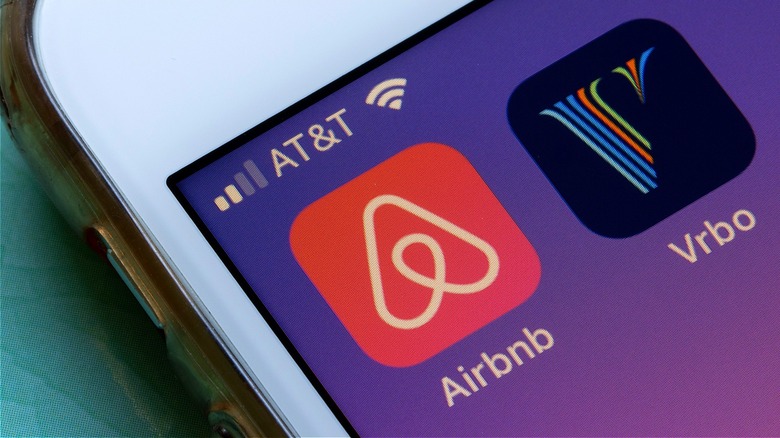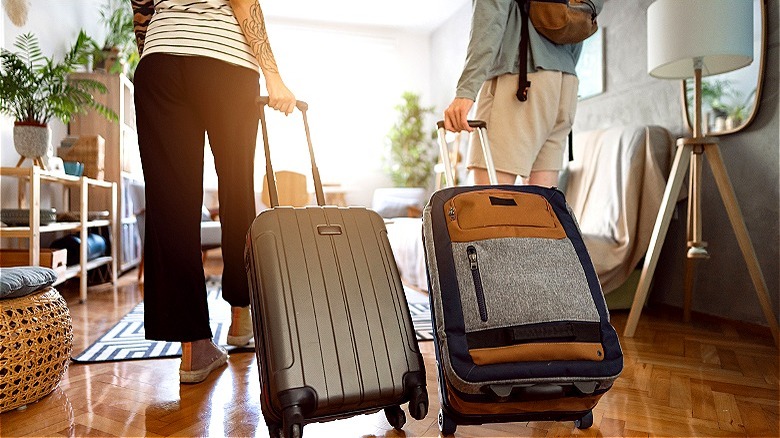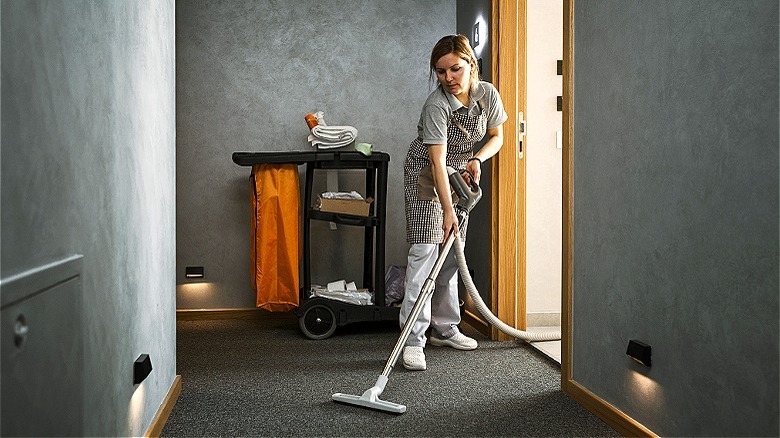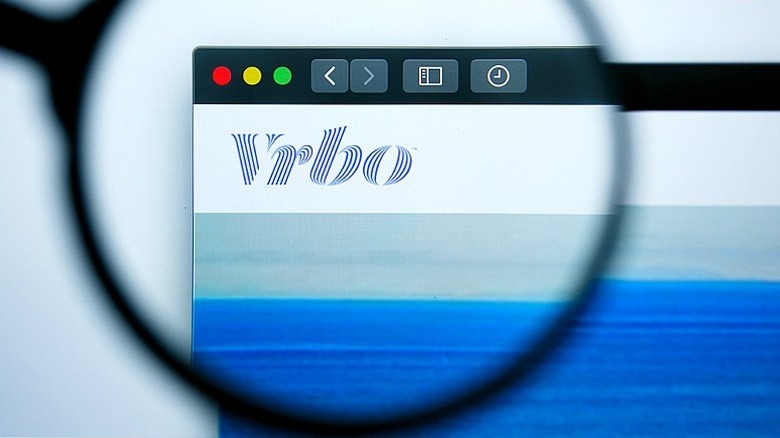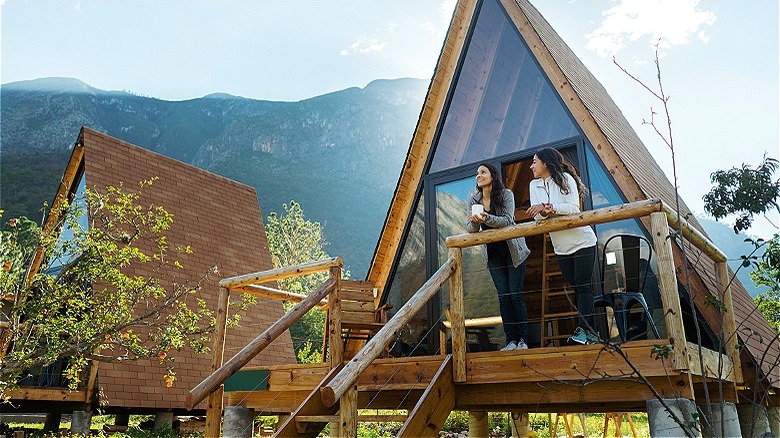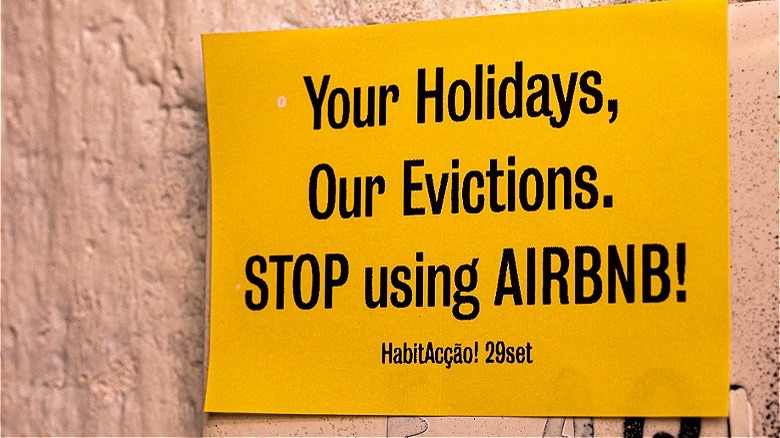Airbnb Vs. Vrbo: Which Will Get You The Better Deal?
Once upon a time, in 2007, people still relied entirely on hotels and motels for accommodations while traveling. However, the introduction of Airbnb in 2008 completely upended and changed the traditional model of how people vacationed and traveled. By creating a peer-to-peer system, Airbnb allowed people to manage housing accommodations directly with locals in the places in which they were visiting. In the years since, other home-sharing and peer-to-peer room-rental apps have been introduced with mixed success, but perhaps none have offered as much competition to Airbnb as Vrbo has.
While each app offers its own focuses and accommodation types, it can still be difficult to know which one is better, safer, and (most importantly) cheaper than the other. However, while finding an affordable option can definitely be important, there are a lot of different factors to consider that can have as big or even more of an impact on your overall vacation stay than just the cost alone. Since neither company actually owns any of the properties listed on their websites, there can be a lot of variability when it comes to things like cleanliness, prices and fees, and communication from your selected property.
Operating as third parties, the apps inevitably can (and regularly do) lead to issues with customer service and overall consumer experience. This can leave consumers frustrated, with both companies boasting barely over one star (out of five) through the Better Business Bureau.
Competition
Since Airbnb holds such a powerful grip on the peer-to-peer rental vacation market, there's little competition when it comes to hosts. While alternatives, like Vrbo, exist, they don't command nearly the same market share as Airbnb (which has over 30% of the reservation/online booking market). This makes Airbnb the more obvious and preferred choice for hosts and, subsequently, consumers. Airbnb boasts over 7 million active listings across 4 million hosts around the world. In 2022, its worldwide revenue hit $8.4 billion, the same year it reported its most profitable quarter ever.
This could, on the surface, create more affordable pricing on competitors' websites; however, the differences in accommodation types between Airbnb and Vrbo — along with the variability of host prices — makes it difficult to clearly compare prices. On both apps, homeowners/hosts set their own pricing. This includes the ability to raise rates during peak seasons and special events, as well as set cleaning fees. While homes in the same geographic region will technically engage in competitive pricing with other available units in the area, ultimately, it's up to the home hosts (not Airbnb or Vrbo) to decide on base prices and select fees.
The glut of vacation rental homes across the country post-pandemic has continued to cause drops in occupancy rates. These drops have the potential to create cheaper and more competitive rental prices — depending on how desperate a host might be to earn some income from the listed property.
Fees
Perhaps one of the biggest complaints consumers have with lodging marketplaces like Airbnb and Vrbo comes down to fees. From service fees to cleaning fees, a listed nightly rate can often end up ballooning to a much more significant cost. Both apps charge service fees on top of a booking price, and, according to NerdWallet, these service fees generally end up being around 20% of the base rate. With that in mind, both apps are comparable on these particular fees so neither offers consumers a more affordable option.
Cleaning fees are another big contributor to the overall price of booking a stay through Airbnb or Vrbo. However, these fees are determined by the host/property owner so they can vary widely and aren't dictated by either Airbnb or Vrbo. Due to the fact that these cleaning fees can ultimately add a significant amount to your total (e.g., Nerdwallet found that the median cleaning fee for a one-night stay on Airbnb was $75), short stays are often less economical than longer vacation bookings with these apps.
It's worth noting that Vrbo has historically been more upfront about cleaning fees when displaying total prices during the search process; unlike Airbnb, which only introduced the total price option in December 2022. Plus, even though this option now exists on Airbnb, consumers still must opt in to see the total price. This said, another factor to consider is that Vrbo does tend to have more listings that require security deposits upfront when booking. While these are generally refundable, they can add a level of complication in the event of cancellations.
Customer service
Helpful and reliable customer service can be a huge concern when it comes to booking in apps like Airbnb and Vrbo. While hosts ultimately decide on things like cancellation policies, instances of host issues or incorrect/misleading listings can require consumers to communicate with Airbnb or Vrbo directly. However, unlike with hotels, these companies don't necessarily have someone available 24 hours a day. This means that getting a hold of customer service can be a longer process. With regard to policies, note that Airbnb allows for only a few pre-set cancellation policies, which makes it easier for guests to know what they're agreeing to before booking. Vrbo, on the other hand, allows hosts to set their own custom policies, which can make it difficult for potential guests to know the rules of each listing.
While Airbnb has a B rating from the Better Business Bureau, Vrbo doesn't currently have a BBB rating at all due to an active investigation. Since June 2023, the BBB has been investigating Vrbo's business practices. Specifically, the Better Business Bureau is looking into the volume of complaints and customer reviews left with the BBB concerning Vrbo's unsatisfactory customer service and/or booking guarantees. One of the biggest complaints is how unreasonably long consumers have had to wait before receiving a refund. Similarly long delays are also affecting consumers' ability to get Vrbo to honor its booking guarantee claims and process cancellations of transactions. Despite the BBB requesting specific policies and actions to address these complaints, Vrbo failed to provide any mitigating changes to its current business operations.
Accommodation type
A big factor in choosing between either Airbnb or Vrbo for your vacation rental can come down to just how big of a group you're traveling with. Perhaps the biggest difference between the two apps is the type of accommodations you can find on them. Vrbo primarily focuses on stand-alone homes — meaning it doesn't offer smaller shared spaces or rooms in a larger home. In this way, Vrbo caters more to large groups or families looking for a bigger space for more people. Considering most hotels don't offer larger rooms that can accommodate bigger groups (let alone kitchens or living spaces), Vrbo is definitely the better option over traditional hotel stays for large families and get-togethers.
Airbnb, meanwhile, features a broader mix of accommodation options. From stand-alone homes to shared spaces and private rooms, there's more to choose from for a more diverse group of consumers. Interestingly, some rooms on Airbnb are, in fact, hotel rooms. This said, another accommodation type that Airbnb holds the edge over its competition is unusual rentals, like campsites, geodesic domes, and air streamers. The company's focus on unique experiences can make accommodation offerings, such as these, feel more special, and this can be an important consideration for consumers seeking more experience-driven housing accommodations. Plus, the greater variety means Airbnb could be the better choice for single travelers or even couples who might not need/want the same amount of space in their housing options as a Vrbo consumer might want.
Short-term rental regulation
While Airbnb is mainly credited with disrupting the hotel and accommodation industry, the tech company also created other unintended disruptions in the rental and housing market in the U.S. As the country faces an increasingly dire affordable housing crisis, some cities, and even states, have targeted short-term rental properties as part of the problem. Many have implemented regulations, or even outright bans, on short-term rentals in an effort to not only help residents who don't want the disruption of constant strangers in their neighborhoods but also to help with housing prices and accessibility.
A good example of how companies like Airbnb have negatively impacted the residents of a given place is Irvine, California. Irvine passed a law banning short-term rentals in 2018, which was found to have led to a 3% drop in the Orange County city's average rent prices, according to a 2023 study from Real Estate Economics. Similarly, a short-term rental study published in the Journal of Urban Economics found that home-sharing ordinances reduced rents in Los Angeles County by 2%.
Short-term rentals can not only be disruptive to residents and neighborhoods but they can also have more far-reaching impacts by raising rents and limiting the supply of units for rent or purchase. With more people purchasing either second properties or large properties with the express intent of using it for short-term rentals, the amount of available homes in the housing market shrinks. This leads to low inventory that can't keep up with demand, which, in turn, further contributes to high housing prices.
